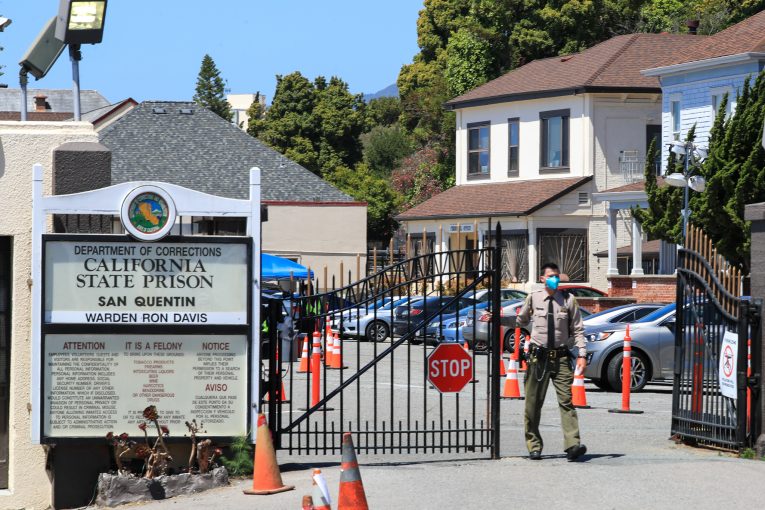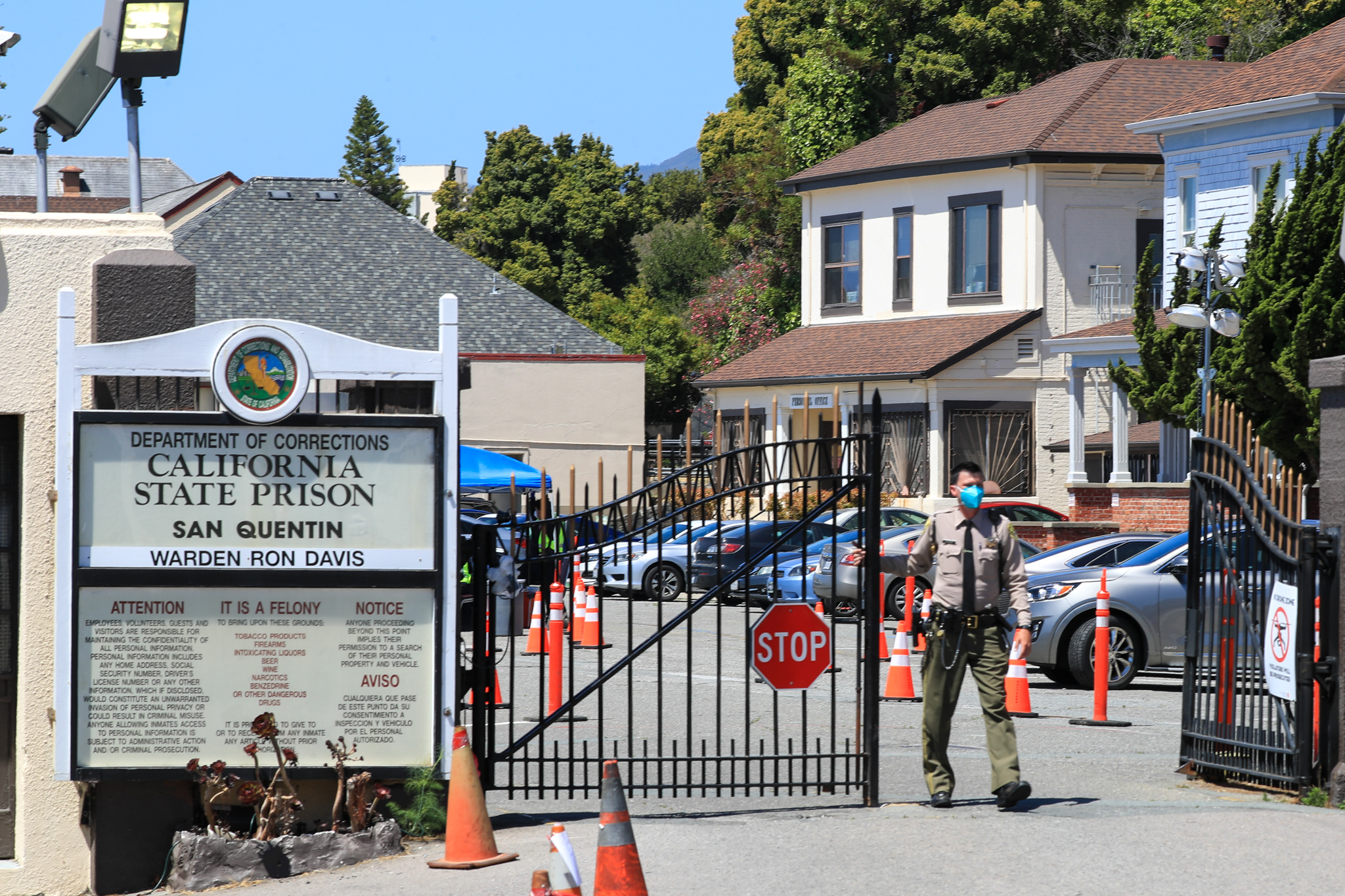

By Kathryn Wood and Jose Medina
MARIN, CA – An inmate and Public Health Officer for the Department of Health and Human Services for Marin County testified here Friday in Marin County Superior Court in an ongoing evidentiary hearing looking into San Quentin prison and California Department of Corrections and Rehabilitation (CDCR) for their actions, and inactions, during the COVID-19 crisis.
Public defender Tom McMahon brought a witness in to testify about his living situation at San Quentin during the pandemic, which the witness described as a gymnasium converted to a dorm-style living facility, where 108 inmates were housed.
He explained that this situation took a large toll on his mental health, noting, “I had racing thoughts… I isolated myself. This is not the person I am,” he said he would tell himself.
The witness had been working as a liaison for the inmate advisory council, holding a responsibility for the incarcerated population.
He explained that he would ask the warden questions about the beds following social distancing guidelines, noting, “We were told that the beds were going to be 6 feet apart, however they were 3 feet apart.”
“Did you fear for your life?” McMahon questioned, and the witness said he did, adding fellow inmates commented on how he was engaging in “bizarre behavior.”
The witness began sitting outside the gymnasium and dancing. “It was my form of spiritual freedom,” he said.
“A lot of people would talk to themselves, were up all night, or would sleep during the day,” he maintained, and after mentioning that they did not have “adequate bacterial soap,” he added that he does not “believe there has been enough testing.”
Defense attorney Sarah Sanger called the next witness who continued to describe the conditions during the COVID-19 outbreak.
When he explained the cells, he expressed that “they’ve never cleaned them… they all had bars and were open… and there was no ventilation,” and his vent was “stuffed full of dust” and he “never felt air coming out of it.”
He noted that the first mask that inmates received in March were cloth masks. In late July, everyone got N95 masks “after the whole facility has been affected.”
The correctional officers started to wear masks when the “spread became rampant,” he stated. “A lot of more inmates wore masks…I wore mine in the cell…we didn’t have a lot of protection…what we had was what we got,” he said.
Additionally, there were no sanitation procedures for food and they “brought it to us on a cart on a brown tray and would give it to us barehanded,” he stated.
The witness added that the people handling food wore masks “50 percent of the time.”
When inmates tested positive for COVID-19, the workers would put red tape around their cell. Both witness’s neighbors tested positive for COVID-19.
He talked to one of his neighbors every day and “immediately noticed something was wrong with his health. You could hear it in his chest…he couldn’t breathe…he belonged in the hospital for sure. It sounded like his lungs were full of mucus…he couldn’t get enough oxygen,” he added.
When Sanger began to ask the witness if he “saw his friend die,” he began to choke up, commenting that he “talked to him an hour before” and “he said he was going to lay down and take a nap.”
The witness began crying as he explained that when the medical staff came by, his friend was not responding. The witness began to yell at the staff that he was not breathing.
When they returned with more medical support, they dragged his friend out by his feet and started to do CPR for 55 minutes.
The witness, continuing to cry, mentioned that he “watched the entire time this was happening with a mirror. “It felt like trash…they treated him like cattle…they didn’t treat him like a human.”
The next witness shed some light on the ill-preparedness and indifference that San Quentin had displayed in the months leading to the outbreak that endangered the lives of countless incarcerated people.
Dr. Matt Willis was brought in to testify about the events that lead to the outbreak in San Quentin and his interactions with the prison. He is the Public Health Officer for the Department of Health and Human Services for Marin County.
During the outset of the pandemic, Dr. Willis informed the court that he had contact with all local hospitals and medical care providers in Marin County, including San Quentin State prison, through the Healthcare Preparedness Program (HPP).
He recalled that all medical care providers were asked to submit a plan of how they would respond to increases of COVID-19. While medical care providers complied with the request, San Quentin prison did not offer a plan nor were they meeting deadlines set forth by the HPP.
Dr. Willis repeated to the court that, as an epidemiologist, not receiving a plan from San Quentin prison was a recipe for disaster. He stated “this is a prison where you have large numbers of individuals gathered close together and it is very challenging to manage when an outbreak occurs.”
Apart from not being presented with a plan from San Quentin prison, Dr. Willis was notified of the transfer of incarcerated people from CIM (California Institute for Men) to San Quentin last June 1. The Department of Health and Human Services immediately held a meeting with San Quentin the following day with the intention to discuss COVID outbreak prevention and safety recommendations.
The recommendations that the Department of Public Health provided were for CIM transfers to not be cohorted with other incarcerated people in San Quentin, use proper PPE including N95 mask coverings, and to not transfer staff from one unit to another especially if they are from a unit with an infected person.
Unfortunately, they were met with indifference by the San Quentin officials and warden, he said.
Dr. Willis recalled that the warden “was only interested in assistance with COVID testing” and added “he was not interested in a plan to contain an outbreak.”
Despite this cold reception, Dr. Willis recalled providing recommendations in the event of an outbreak but the San Quentin officials told him that the CDCR had a one size fits all plan for all prisons throughout California.
He stated that the “answer that we received was that CDCR did have a generic plan for all of their institutions across the state that was deemed sufficient.” He said he and his colleagues disagreed with this sentiment and added “our opinion was different because of the uniqueness of every setting.”
Dr. Willis informed the court that, at the time of the meeting, Marin County’s Department of Health was not the only entity with concerns about San Quentin’s lack of a plan. Hospitals in Marin County were concerned as well.
He stated that “our hospitals knew that if there was an outbreak in the prison the inmates that would get sick would have to come into our hospitals and our hospitals were already seeing surges of COVID-19 cases from the community so that was part of what was driving that need.”
Through regular contact with medical staff at San Quentin, Dr. Willis learned that the Department of Health’s recommendations were not being followed.
In an effort to try to get San Quentin to comply with the recommendations, Dr. Willis contemplated using an official order to comply with recommendations. He thought that as a public health officer he could use his statutory power to control the spread of the disease
However, Dr. Willis soon learned that “CDCR had made a ruling that local public health officer orders do not hold in state prisons because they are a piece of the state within our local jurisdiction so all public health officials orders do not apply so that was the basis of which our recommendations in the eyes of CDCR not binding.”
Dr. Willis reflected on his interactions with San Quentin prison and learned that “there is an important difference between what is endorsed on paper, or verbally, and what is put into practice.”
The hearing will reconvene on Monday morning.
 Kathryn Wood is a third year at UC Davis, majoring in Political Science-Public Service and minoring in Professional Writing and Environmental Policy Analysis and Planning. She is from Petaluma, California.
Kathryn Wood is a third year at UC Davis, majoring in Political Science-Public Service and minoring in Professional Writing and Environmental Policy Analysis and Planning. She is from Petaluma, California.
Jose graduated from UC Davis with a BA in Political Science and has interned for the California State Legislature. He is from Rocklin, CA.
To sign up for our new newsletter – Everyday Injustice – https://tinyurl.com/yyultcf9
Support our work – to become a sustaining at $5 – $10- $25 per month hit the link: